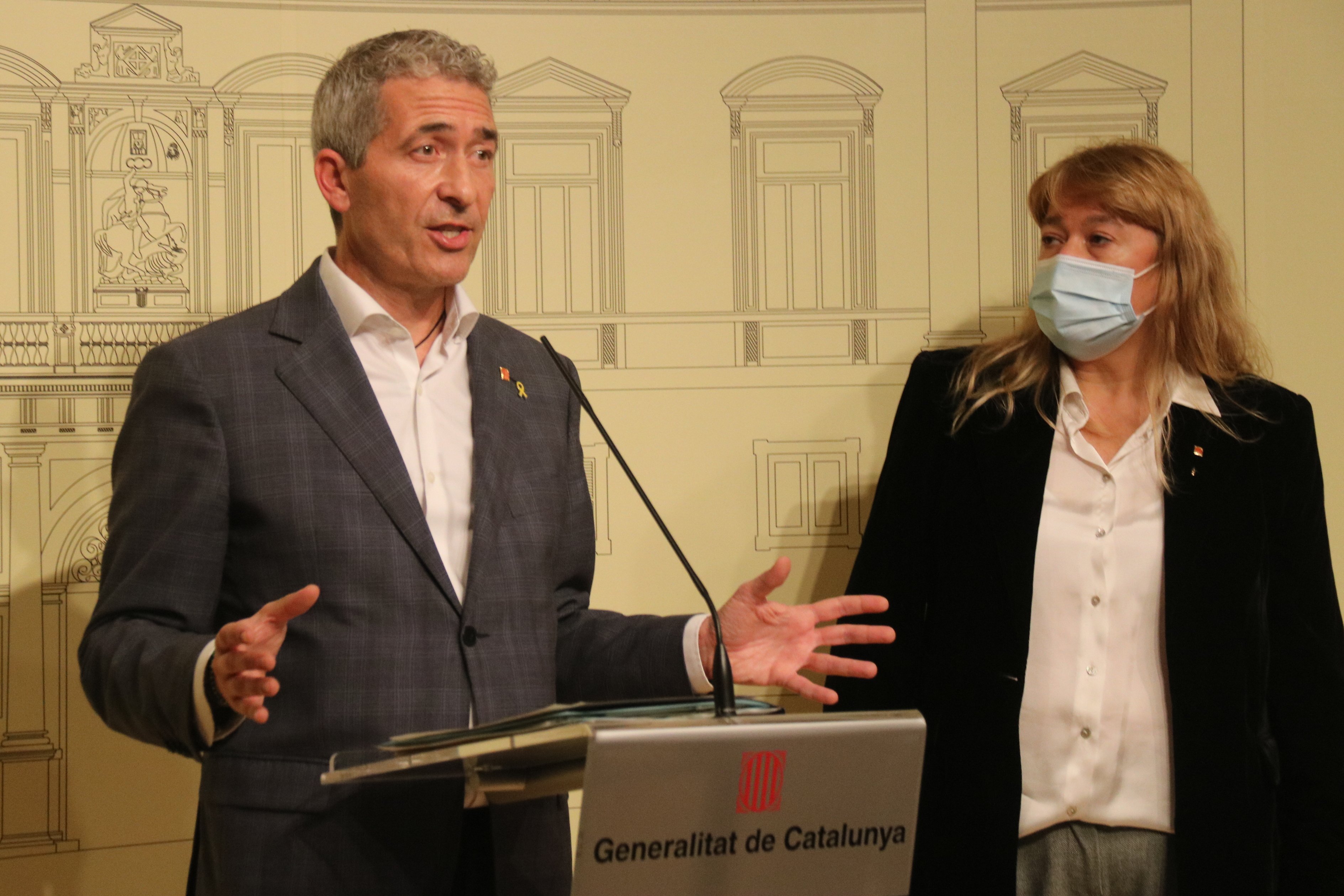The Spanish Supreme Court has not accepted the appeal lodged by the Catalan government against a judicial ruling obliging schools in Catalonia to teach 25% of their classes in Spanish. The news, which broke this afternoon through the release of the court's decision, led to an urgent press appearance of the Catalan education minister Josep González-Cambray and the culture minister Natàlia Garriga. “The Supreme Court has exceeded its powers in taking a position on pedagogical issues,” said González-Cambray. For the sentence to be applicable, the Spanish education ministry must request that it be enforced.
At the beginning of the month, the Catalan High Court (TSJC) annulled a school teaching plan because it considered that "it does not include the vehicular character of Spanish as an official language". This is the language plan of the Puig de les Cadiretes school in Llagostera, near Girona, which stated that Catalan would be "the structural backbone" and "vehicular language" of teaching at the centre. An administrative disputes chamber of the TSJC ruled that this plan "is not in accordance with the law", as it does not guarantee that children will receive "education that includes Spanish as a vehicular language in a reasonable proportion." With this latest decision, six school language plans have now been vetoed by the TSJC. These include the Puig de les Cadiretes school in Llagostera (public), Frangoal school in Castelldefels (public), Aura school in Reus (public), Els Pallaresos secondary school near Tarragona (public), Bogatell school in Barcelona (public) and Josefina Ibáñez school in Abrera (public). Until now, families have presented individual appeals against the rulings, but in this case, the Catalan government lodged an appeal against the TSJC ruling of December 2020, requiring 25% of school hours to be taught in the Castilian language (as Spanish is usually known in Spain). But this attempt to re-assert the three-decades old model of Catalan language immersion and prevent a court from intervening in the curriculum has failed: the Supreme Court did not even admit the appeal to proceedings and upheld the 2020 ruling.
VIDEO: "This is a serious attack on the foundations of Catalan school system perpetrated by a court that is distant from and ignorant of the sociolinguistic reality", says Catalan minister González-Cambray.
Despite recognising the Catalan language "as the centre of gravity of the education system", the TSJC asserted the greater importance of the right to have a part of rhe classes taught in Spanish. In its judgment, the court recalled that the current law provides that "the minimum presence level of Spanish as a vehicular language in the course and class in which the appellant's child conducts his studies is to be 25% of the effective teaching hours, which must be taught in this official language" and that "in addition to the hours dedicated to learning the Spanish language itself, at least one other non-linguistic curricular area or core subject or subject of similar nature [must be taught in Spanish]". But the Catalan education minister today noted that the Spanish ministry says that it is necessary to guarantee the learning of both languages without referring to any percentage.
Catalan minister's message
However, in the face of this of the ruling, which has been confirmed due to the refusal to admit the Catalan government's appeal, the Catalan education minister has called on schools to "continue to work as before". "This is not about percentages. This is about pedagogy. I ask for the utmost respect for our students and for the professionals in our education system. School in Catalonia - in Catalan," he asserted. González-Cambray described the Supreme Court's move as a "serious attack on the foundations of Catalan school system perpetrated by a court that is distant from and ignorant of the sociolinguistic reality". "The Catalan education department is, will be and always has been at your side", he told teachers. "You must continue to work as before, which is to continue educating our children and our young people," the minister added.
González-Cambray defended the model of Catalan linguistic immersion: "It is a model with very broad social consensus and a large parliamentary majority. An educational model in which the Catalan language has been and is a fundamental tool," he said. The education minister remarked that the Catalan school system also acts as a fundamental integrational element for the newcomer population and that the linguistic model has been built on a broad social and pedagogical consensus. "We are not facing a language conflict, but the decision of a court that does not know the reality," he said, recalling that since 2005 only 80 families have applied for schooling in Spanish. And thus, he rejected that it should be "a judge who arbitrarily determines the percentage of hours it takes to learn a language; this represents an anomaly."
Language immersion since the 1980s
In August, the Spanish education ministry stated that regulating the percentage of classes that should be delivered in each language in Catalonia is up to the Catalan authorities, as competence over the area of education is held at the level of autonomous regions and not by the central Spanish government. At that time, ministry sources said that a decision in Madrid to apply the ruling on 25% minimum teaching in Castilian would be invading the powers of the Generalitat of Catalonia.
Since the 1980s, the public education system in Catalonia has been based on a principle of language immersion, with the Catalan language being used as the teaching language for, at least in theory, the vast majority of classes at both primary and secondary level, in order to ensure that all students learn not only the more socially-prevalent Castilian language, but also the Catalan language.

